I wanted to write this article before even seeing this film. This was due to the comments people had made about the Joker film concerning mental health. At the time, two things crossed my mind.
Disclosure: This article contains affiliate links. If you click through and make a purchase, I’ll earn a commission, at no additional cost to you. Read my full disclosure here.
One. Mental health isn’t always bad. But it’s not always good either, so you need to show both sides. Demanding only positive interpretations isn’t helping, it’s just sanitising it.
Two. All serial killers are psychopaths, but not all psychopaths are serial killers.
These were my initial thoughts before seeing the movie. Below are some of the reviews about the film concerning the characters’ mental health, and my thoughts after seeing the movie.
Joker Spoilers Ahead
“Joker” centers around the iconic arch nemesis and is an original, standalone fictional story not seen before on the big screen. Phillips’ exploration of Arthur Fleck, who is indelibly portrayed by Joaquin Phoenix, is of a man struggling to find his way in Gotham’s fracturedsociety. A clown-for-hire by day, he aspires to be a stand-up comic at night…but finds the joke always seems to be on him. Caught in a cyclical existence between apathy and cruelty, Arthur makes one bad decision that brings about a chain reaction of escalating events in this gritty character study.
One of the more toxic ideas that Joker subscribes to is the hackneyed association between serious mental illness and extreme violence.
I think that’s an oversimplification. Arthur didn’t set out looking to hurt people. When he was jumped by the kids who stole his sign, he didn’t go looking to hurt anyone. The gun in his position was given to him by a coworker, rather than something he sorted out, and he did try to turn it down. Even when he was attacked on the train, he didn’t turn to violence, not until his attackers became aware of the gun he had. Only then did the situation get out of hand, and he engaged in violence.
Arthur was reluctant to engage in violence until everything started to stack up against him. His issues, the lack of funding to support him with his medication and his social worker, and then the series of detrimental events that befell him, until he eventually just broke. Without this never-ending pile of stressors being dumped upon him in such a short space of time, Arthur may never have become violent.
Furthermore, even the most mentally well people could break down after this amount of stressors to deal with. Although, the most likely outcome for people who can no longer cope after having to deal with this many intense stressors is to try to take their own lives. But is turning to violence that much of a stretch?
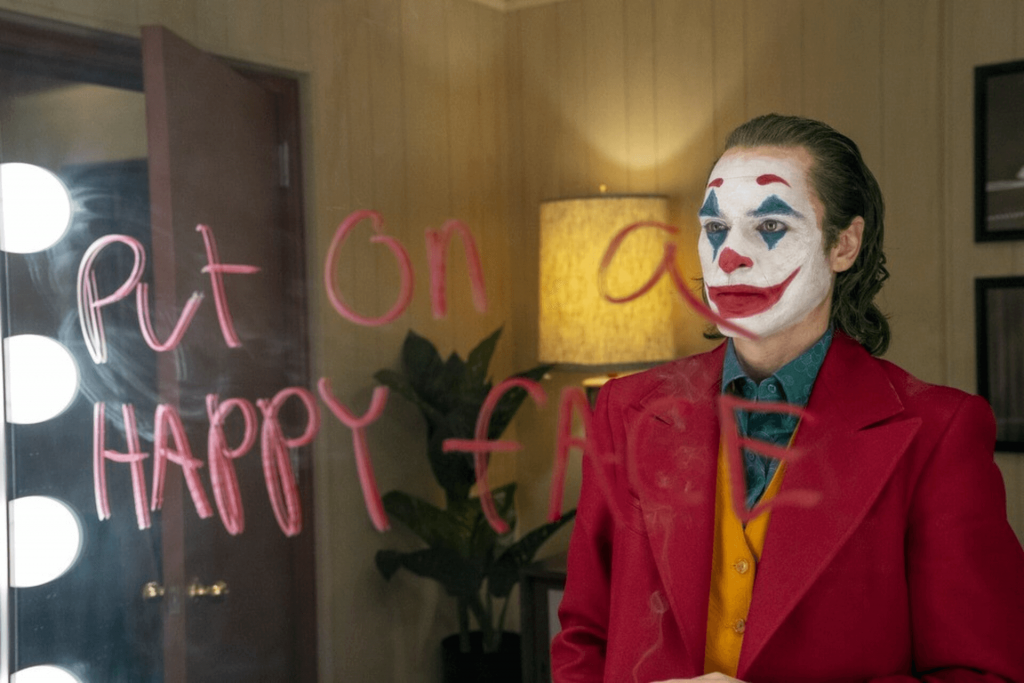
This view on stressors and suicidal acts is supported by Overholser (2003), who stated that these acts can be triggered by an individual’s series of stressful life events. The number of stressors, the type of stressors, and the lack of control over the stressful events all being significant in understanding why people try to take their lives. That’s because not all stressors are bad, some are often minor, and others are just plain common.
Chronic stress, for example, puts the brain’s defensive system on high alert. This happens because the emotion of stress is our unconscious mind evaluating our internal and external environment and concluding that we are in danger
In short, being under chronic stress could, if not properly managed, trigger an inappropriate burst of rage, i.e. violence. Which, if true, could also explain what happened to Arthur. This is because the quick succession of stressors in his already stressful life would constitute chronic stress.
When you look at what happened to Arthur to turn him into the Joker, can anyone claim that any of these stressors were either common, positive, were within his control, or the number of stressors wasn’t overwhelming?
No. Then it’s not that much of a stretch to see how Arthur, instead of becoming suicidal when he broke, he instead became violent. Especially if he’s suffering from “delusional ideas of a grandiose nature (“I am an undiscovered comedic genius”)”(The Guardian).
Whereas it might be more common for people to snap and take it out on themselves, such as seeking to end their lives, in some cases, people lash out at others instead. With Arthur, you get to see the battle between taking it out on others or taking it out on himself, play out.
Furthermore, a good point was made by Dr Ziv Cohen, a criminal psychiatrist and clinical assistant professor of psychiatry at Cornell University:
Some of the greatest crimes in human history were committed by persons with no mental illness or evidence of psychopathy in their daily lives
But they don’t even need to be crimes on that scale. As I’ve said, even mentally well people can snap and become violent. Thus, what we have to ask ourselves is, without the catalogue of stressors Arthur suffered, would he have become violent? If the answer is no, then his mental health problems weren’t what made him violent. His mental health was just another stressor to add to the growing list.
Have any of you watched the film ‘Falling Down‘ starring Michael Douglas? The film is about a divorced man, who recently lost his job, and whose ongoing frustrations cause him to snap, and essentially, “go postal”, with ever-increasing violence. Watching the Joker reminded me of this film because of its plot similarity with how a series of stressors caused a violent break. The difference is that the Joker explores the stressors, whereas Falling Down focuses largely on the escalating violence.
For those of you who don’t know, ‘going postal’ (Urban Dictionary, Foozi100, July 23rd 2005) is a slang phrase that was originally coined to refer to a series of real-life shootings that transpired within the postal service in the US. But now usually refers to people going off the deep over what people see as trivial things.
Having the potential risk factors that Arthur had, even before the deluge of stressors befell him, doesn’t mean that a person will be violent. Individual differences will also be a factor. Many people with mental health problems who undergo a host of stressors don’t turn to violence or even suicide.
In fact, although a person’s snap into violence may come as a total surprise, in most cases there is a psychological buildup to that point, said Dr Peter Ash, director of the Psychiatry and Law Service at Emory University in Atlanta, Georgia
And.
There’s a pathway to violence that starts with some thinking and then fantasizing about a plan
It is possible that by the time Arthur becomes the Joker, the delusions that were positive to him have all been shattered. Thus, when he went on the talk show to announce himself as the Joker to the world, he could have been fantasising about what he was going to do on the show. But we may never know that as showing the audience, those fantasies would have ruined the surprise of what happened.
This is especially true when, if like me, you thought he was going to kill himself on the show. Or at least fail in his attempt to do so.
When Collider’s Steve Weintraub spoke to Phillips and Phoenix, the director confirmed that Arthur originally planned to take his own life but changed his mind in the moment to send a message
Thus, it was the idea of Arthur to end his life, originally. Which is the more common reaction to feeling broken and completely hopeless. With only what transpired on the show changing his plan, and as a result, engaging in further violence. The statement he was going to make, changed.
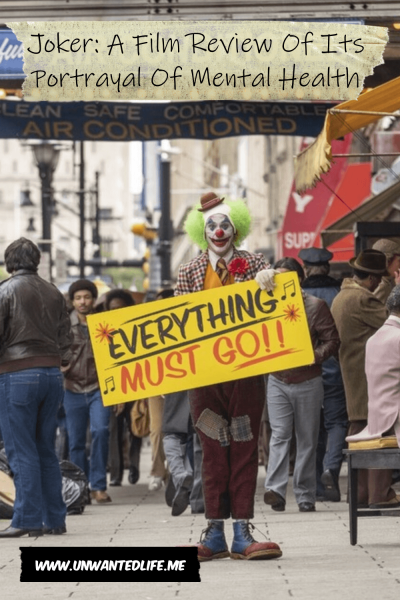
This is the defining moment when Arthur, now the Joker, embraced using violence to send his message. No longer is he the man who first used violence in self-defence on the train, which quickly escalated out of control. The battle between taking out the violence on himself or others was finally decided.
However, even though Arthur felt hopeless, with his whole world coming apart, that didn’t excuse his actions. Even if such a situation is one in a million, this is a film about a comic villain, and as such, it will take a more extreme outcome to provide entertainment.
Another risk factor is a condition called delusional disorder — and in particular the “persecutory type” — that causes people to believe that someone is plotting against them, Rossiter said. People with psychotic depression and schizophrenia may also develop such delusions, he said.”
We know that Arthur suffers from delusions, and from what we see during the earlier parts of the film, they’re positive delusions for him. He gets the girl and they fall in love and the talk show host (Murray Franklin) praises him. But this changes once his reality bursts his delusions. Thus, it could be reasonable to assume that once this happened, his delusions might take a more sinister turn, believing that people are plotting against him. Which, the series of stressors he was exposed to could confirm to him.
However, it should be noted that people with schizophrenia or another disorder that could cause delusions rarely turn to violence. Also, Arthur may not have turned to violence himself if it wasn’t for the stressors causing him to break, which then led to him reinventing himself as the Joker.
Arthur’s descent into violence and destruction is triggered by his mental deterioration. The result of this is to – disappointingly – remove Arthur’s agency and divert attention from a potentially more stimulating conversation about wealth inequality and its responsibility for societal collapse.
I think this is an unfair criticism. They make a point of the social worker stating that their funding has been cut and that the state doesn’t care about people like him, or her (the social worker). Throughout the film, they show how Arthur, and the city as a whole, are poor and struggling, with Arthur struggling more than most with having to look after his mother and dealing with his mental health problems.
The film also shows us how billionaire Thomas Wayne lives up to the privilege of wealth, accompanied by his disdain for the poor, and mocking of people like Arthur. This bleak image shows us how a lack of wealth and no access to health care are critical factors in shaping who Arthur becomes. Which he only becomes through the stress of his sense of self, being destroyed by his stressor events.
Mental health and health services, or lack thereof, are the key messages of this film if anything. Proper support goes a long way. At least that’s what my takeaway from the film was as someone who suffers from multiple mental health problems. Speaking as someone who has suffered from a drug-induced psychosis, and has had problems with getting the treatment I need (Taking Antidepressants And Being Forced To Go Cold Turkey, My Experience Of Being In One-To-One Schema Therapy, My Experience Of Being In Group Therapy: Part 1, and My Experience Of Being In Group Therapy: Part 2), I know how hard it can be without a working support network around you.
However, Arthur’s mental state indeed deteriorated, but most people probably would in that situation. As it did in Falling Down.
Psychiatrists Vasilis K. Pozios and Praveen R. Kambam of Broadcast Thought, a group that provides mental health consulting to film and television projects, expressed concern that “Joker” relies too much on the character’s mental illness.
I don’t believe that’s entirely true. I think his mental health problems are the stressor that ties the rest of his backstory together. I don’t see it as being something that’s overly relied on. The film, for me, portrays how the series of stressors are the true cause of Arthur becoming the Joker, and that his mental health is important only to highlight the other stressors that befall him.
Thus, making the collective stressors the main focus of his backstory. His mental health problems tie all the stressors together, and as such, is important to the plot because of that, not because his mental health is the cause of his violence or the key feature of the film.
This is a view that Praveen R. Kambam of Broadcast Thought, also noticed, to a certain extent.
But Kambam points out that “Joker” takes pains to show how traumatic aspects in Fleck’s life lead him on the “pathway to violence,” not just his mental illness
So it’s good to know that I’m not the only one who noticed this about the film. I was starting to think I was the only one who’d noticed how this plot was designed, even if they only partially see my viewpoint on it.
Joker relies on a tired and destructive trope: child abuse leads to mental illness that is murderous in character
Does it though? The child abuse gave him brain damage that caused his laughing disorder. That much is true. But Arthur didn’t show any signs of violent tendencies until after the incident on the train. He was meant to be 35 by the time we saw him in the film.
So stating that the film is using the tired trope of child abuse that leads to a character being a violently and mentally unwell person is just wrong. Turning murderous had little to do with his child abuse, although finding out about it would have added to the strain he was under as an additional stressor.
And like I’ve said, without the onslaught of stressors, Arthur may never have become a violent person.
We wouldn’t want to get bogged down in labels, but the psychopathology Arthur inhabits is foggy at best: his apparent lack of disordered thinking means the attempt to illustrate psychosis is half formed
Much like the writers of this article are meant to be speaking from their personal experiences “As junior doctors who work on acute inpatient psychiatric wards, serious mental illness is our daily reality” (The Guardian), I too will be talking about my personal experience with my drug-induced psychosis and psychotic episodes.
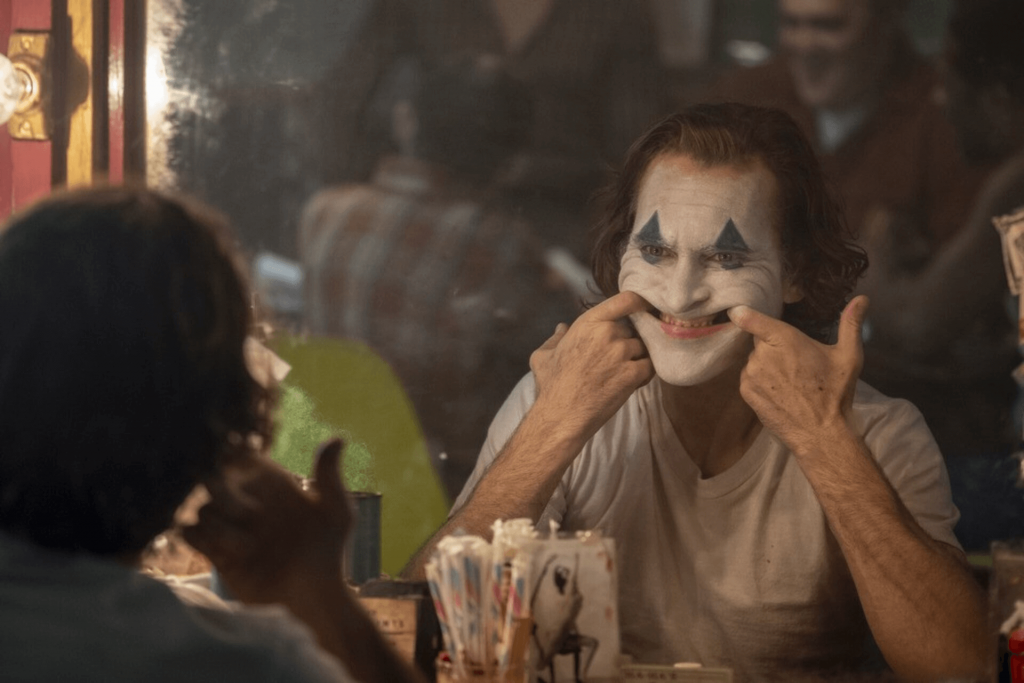
My BPD is no longer typical of the classic presentation, whereby I can’t control my emotions and I’m reckless. My drug-induced psychosis was the same. Only one psychiatrist noticed this fact about my BPD and how I could control my emotions, which they admitted would be a huge problem for getting support for my BPD.
When I suffered my first psychotic break, due to drug use (Drug-Induced Psychosis And My Anxiety Disorders), I was left with daily psychotic symptoms whereby I would be suffering from hallucinations that would affect more than the traditional five senses. My hallucinations also affected my sense of temperature, moisture (wetness perception), etc. as well.
But even with all this to deal with daily, for over 10 years, I never had disordered thinking. No matter how bad it got, even when I was reduced to only being able to say one sentence, over and over again, “What’s going on?”, my thinking never became disorganised. Thus, it could be possible that Arthur was like me in this instance, and didn’t suffer from disorganised thinking.
People with psychosis sometimes have disturbed, confused, and disrupted patterns of thought
What I’m getting at is, not everyone will tick all the boxes of a disorder, and because we’re all different, we can all present and be affected by these disorders differently.
Someone who develops psychosis will have their own unique set of symptoms and experiences, according to their particular circumstances
This view is also supported by Dr Cohen:
“Fully alive characters, like people, can never be reduced to a simple diagnosis,” he explained. “For example, when we give someone in psychiatry the label ‘bipolar,’ that doesn’t mean that we are reporting on the most interesting thing about that person. It’s just one aspect of that person, and rarely fully explains behavior.”
To address one of the other possible risk factors (stressors) I’ve not mentioned so far, let’s look at Arthur’s laughing condition (Pseudobulbar Affect). It was stated in the film that Arthur’s laughing condition was caused by a brain injury. For the sake of playing Devil’s advocate, it’s possible that this brain injury could be the key factor in his eventual turn to violence, rather than his mental health conditions. Because his brain injury could have caused other unknown problems.
“Damage to the brain’s temporal lobe, which contains structures involved in fear response, has also been suggested to have a connection to violence. “If a person has damage to the frontal or the temporal lobe, perhaps they cannot identify or evaluate the fear appropriately, and perhaps their response is of a more physical nature,” Segal said
However, as I’ve said, I don’t believe any one thing can be picked out as the cause of his turn to violence. I believe it’s the collection of stressors that broke the camel’s back. Arthur’s mental health just happened to be one of those stressors, just like his laughing condition. His mental health was only important to the overall plot as a way of connecting all the other stressors together. To reduce all of Arthur’s and the Joker’s actions down to his mental health problems is extremely simplistic, and if you ask me, completely wrong.
My Joker Review
I have to admit, at first, I wasn’t keen on the idea of a stand-alone Joker film that would exist outside the DC universe. Because, well, it didn’t make a lot of sense. It was surely always going to affect the DC movie universe, even if it wasn’t intentional. If for nothing else than to shape how the next film featuring the Joker would be portrayed.
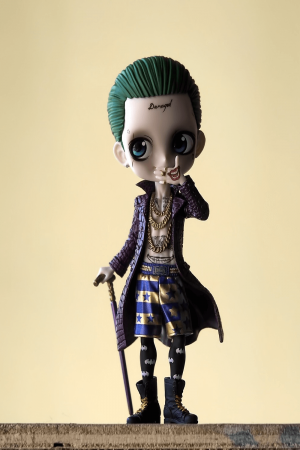
That said, I enjoyed the film. Although I find it hard to tell if I enjoy something at the time, due to my persistent depression, normally I can only tell if I dislike something. That’s due to the boredom that would consume me and my thoughts. But writing this post has helped me to appreciate the film.
I also found little issue with the mental health problems of the lead character, Arthur. As I’ve said throughout this post, I don’t believe Arthur’s mental health problems were the cause of his violence, and I would hope that most people who saw the film would also reach that conclusion. That said, even if others didn’t reach that conclusion, not all mental health problems can be or should be cast in only a positive light.
The acting in the film was great, Joaquin Phoenix really brought this new take on the Joker to life. Even though the violent actions of Arthur and the Joker are inexcusable, the character of Arthur was made real. It allowed you to see him as just another person who was just trying to live their life until his world fell apart.
The film also highlighted the importance of properly funded social services and easily accessible health services.
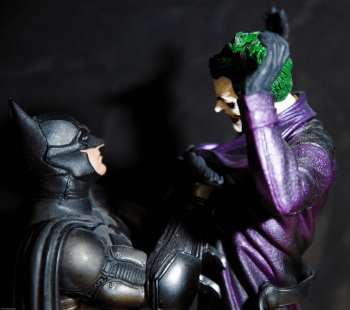
My only real issue with the film is the timeline. Arthur is meant to be in his 30s, possibly 35, according to Fandom. Yet, the death of Batman’s parents happens in this film, as an unforeseen consequence of the Joker killing Murray Franklin. According to CBR.com, Bruce Wayne was 8 years old when his parents died, and according to The Real Batman Chronology Project, Bruce Wayne became Batman at age 26. Thus, that would mean there are 18 years between his parents dying and him becoming Batman, which would make the Joker 53, and that’s if they met in the first year Bruce becomes Batman.
This makes Batman’s arch-nemesis a guy in his early 50s. Not exactly the best age to be taking on a man in his prime, let alone Batman. How are they going to make a sequel work with this in mind? Because after its success, I’d be surprised if they weren’t thinking sequel.
Anyway, I will give this film:

The 4 out of 5 score is largely down to the timeline issue between the Joker and the future Batman, which really niggles at me. This issue may not be the fault of the film, as I don’t know how true to the comics this origin interpretation and the ages of the two iconic characters are. So it might not be fair to lay this at the feet of the film. But nonetheless, it still niggles at me.
Closing
There are two points I’d like to end on:
One. In reality, people with mental health problems are more likely to be victims of violence and crime, rather than to be the perpetrator.
![]()
Two. This film is a work of fiction.
“But we need to remember this a fantasy movie about a comic book villain,” Parks says. “‘Joker’ is not a documentary about mental illness.”
As always, leave your feedback in the comments section below. Also, feel free to share your views on the Joker and the film’s portrayal of mental health and Pseudobulbar Affect in the comments section below as well. If you want to stay up-to-date with my blog, then sign up for my newsletter below. Alternatively, get push notifications for new articles by clicking the red bell icon in the bottom right corner.
Lastly, if you’d like to support my blog, then you can make a donation of any size below as well. Until next time, Unwanted Life readers.

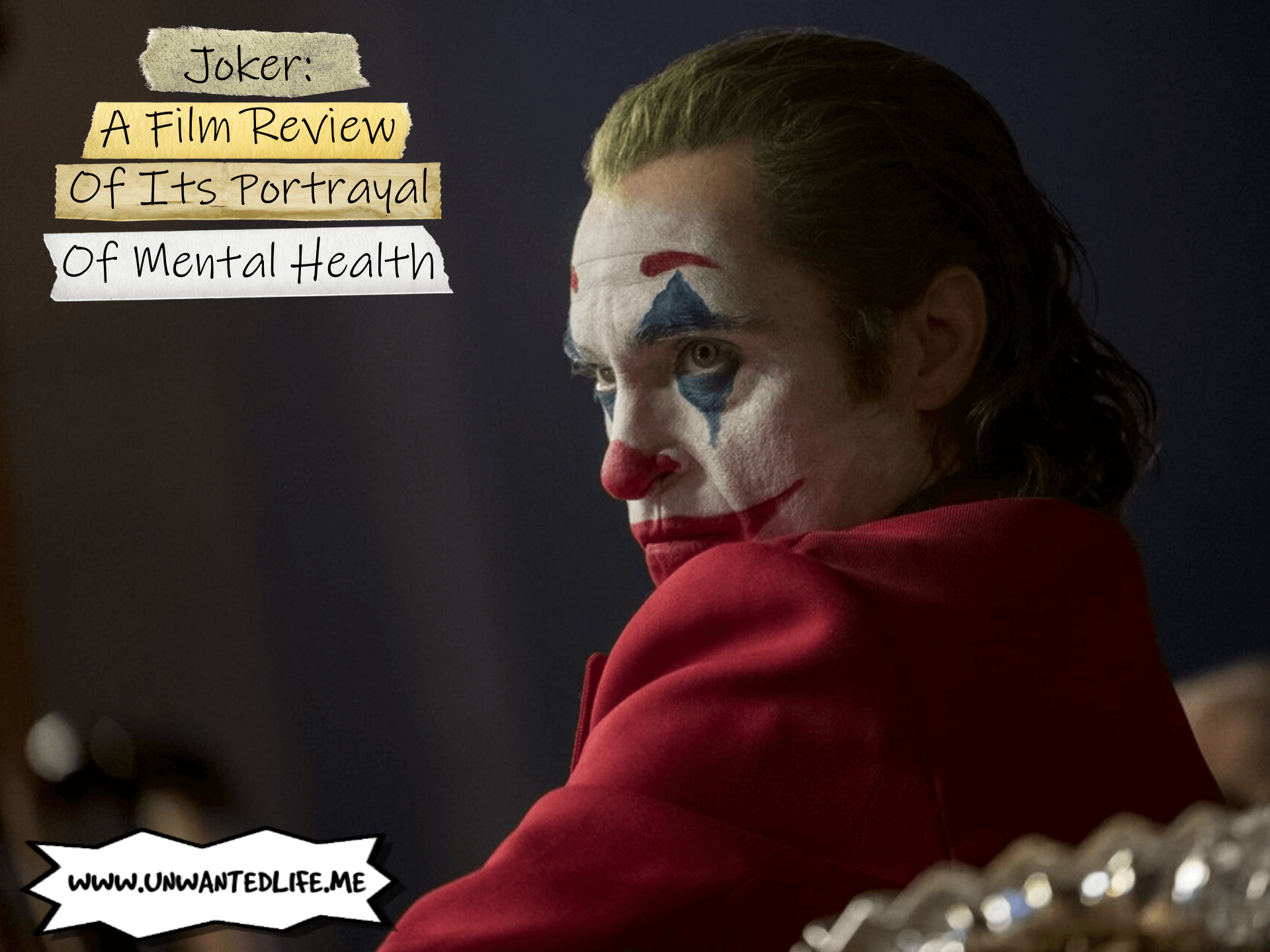
A very detailed and well thought out review. You cover a lot of things I hadn’t considered. I personally haven’t suffered with mental illness but it has touched my family quite significantly so I can agree with what you are saying. I didn’t personally like the film but for me it was just that I didn’t like his character. The acting was good but I just didn’t take to him as the Joker. I found the film long and only really started to enjoy it at all when he became the character. I find it’s weird that they are making different films from different universes the same time and that messes with my head. I am looking forward to the Harley Quinn film but it’s odd that that series has a diff Joker with a diff back story.
There does seem to be a sequel being thought about, which will be interesting to see if they’ll bring in Batman for that or not. I think they won’t, if they do do a sequel.
I’m looking forward to the next Harley Quinn film as well ?
Brilliant post! I really loved the film and I can completely see your point about his Mental health and the violence.
I think it was depicted really well and there will always be people that will pull things apart x
Thank you ?
You’re probably write about how there’ll always be some people who’ll pull stuff apart
Great insights; great article!
Thanks
I loved this. So detailed and informative but easy and smooth to read. I haven’t seen the joker yet, but have definitely read a lot about it. I really appreciate this review. I’ve read a lot of negative feedback regarding it.. and I like how many different areas you touch on here.
Thanks. I hope you enjoy the film when you get around to watching it
This is such an amazing review, and I really appreciate it, I’ve wanted to see it for so long but now I’m not sure!
Love, Amie ❤
The Curvaceous Vegan
If you’ve wanted to see it, then don’t let my review put you off. What we like is very individual. As they say, art is in the eye of the beholder
This was a very thorough review and I appreciate the points you made. I am now curious to see the film whereas I wasn’t before!
I hope you come back and let me know what you think of the film ?
I loved your review/analysis and how you broke everything down! I personally loved the movie, and I really sympathized with Arthur and his suffering, as someone who suffers from mental illness themselves, though of course I cannot condone his violent actions at all. Some of Arthur’s quotes that he wrote in his journal really hit me hard, because I related to them so much. In fact, I related to a lot of things in this movie so much that I was actually uncomfortable watching it, because I saw so much of myself in Arthur’s suffering. And you’re right, most people with mental illness are more of a danger to themselves than they are to others, but sadly, in very small instances, that isn’t the case. Which is why it’s important for mental health services to be available to everyone who needs them and to help prevent cases which could possibly turn violent. I know Joker is just a comic book villain origin story, but honestly, it felt like so much more to me. It brought up these issues of mental illness and lack of health services for those who need it, which I hope can open up conversations with people (and I know there was that whole other storyline about privilege that people thought should have been talked about more, but I think the main focus of this movie was of Arthur and his mental illness and trauma, while the whole privilege storyline served as a backdrop for Gotham and the times). I have to admit I’m not too bothered by the whole Batman/Joker timeline because as much as I enjoy a Batman movie, I’m not THAT into it. I think if you were even to take out the whole Batman/Joker thing from the movie, it would still be a somewhat realistic movie of a man struggling with mental illness. And I think that’s really impressive, in my opinion.
Fantastic post!!!! I really liked hearing your thoughts about it!
Emily | https://www.thatweirdgirllife.com
I know the timeline thing is kind of trivial, and my knowledge of DC and Mabel comics is limited to the films and cartoons I’ve watched, rather than reading the comics. It’s just one of those things that gets to me, like people make up fake science stuff to make an incorrect claim. It just gets to me ha ha ha
I related to a lot of what happened as well, I image a fair few people with mental health problems might also feel that way.
I’m glad you enjoyed the film and my review/analysis ?
I am still wondering if the whole story was 8n Arthur’s mind and he was in Arkham the whole time. Even the end when he allegedly killed the social worker was interesting. I would love it if they could somehow incorporate this into the universe of Matt Reeves upcoming Batman.
Is the new Batman film going to be part of the DC universe?
Not justice league and previous stuff
Did you know your WordPress account you comment with doesn’t connect to your blog? I tried to visit yours but instead I’m greeted with a message saying you’ve deleted your blog
This is an awesome post! Having recently seen the film, loved it but felt a bit uncomfortable watching it (because that’s how you were meant to feel watching a man beat down in society and seeing him struggle with it), it’s fascinating to read your thoughts and the feedback that the film received. ☺️
Thank you for taking the time to read my review
This is such a detailed post! I absolutely loved the Joker, it is such an excellent film. I thought Joaquin played this part perfectly! Such a great point about the properly funded social services, I think a lot of people overlook this.
Thanks ? ?
As much as you guys enjoyed this movie, I want to watch myself haha. I agree with your thought, not all psychopaths are killers.
This is an excellent and detailed post about the Joker and his mental health. Thank you.
Good information sharing on mental health, and good review on The Joker. I learned a lot about mental health by reading your post.
Thanks for reading it ?
Very great read, good details. I loved the film.
Thank you ?
You make great points. The film sheds light on some of the reality of mental illness, but people should also realize that this is a fantasy comic book world. I also thought the timeline between him and Batman was a bit off… Perhaps a man in his 50s taking on a man in his “prime” is also part of the craziness! I also hope for a sequel!
Thanks you. The DC universe, even though this is meant to be a standalone film, might make it hard for a follow up to be made. But we can hope
Yes, hopefully they can find a way! It’s kind of impossible to watch it without comparing it to the entire DC universe.